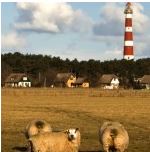Knowledge Networking Portal for Sustainable & Responsible Tourism










 Ameland (NL)
Ameland (NL)
| Contributor | DiegoNunez |
|---|---|
| Country | Netherlands |
| Keywords |
|
| Release date | 26/06/2014 |
| Landscape type | Coastal |
| Topics |
|
| GSTC Criteria for Destinations |
|
| Marketplace category |
|
| Type |
|
| # | File name | Contributor | Release date | Uploaded by | Upload date | Size | Content type |
|---|
| Good Practice Innovation Sheet | ||||
 |
||||
| Items | Description | |||
| 1. WHO | ||||
| Key people and organisations (initiator, leader, partners) | Coastal and Marine Union EUCC and the Municipality of Ameland | |||
| Key Figures | Surface | Inhabitants | Tourism arrivals | Tourism nights |
| 273.50 km2 | 3500 | N/A | N/A | |
| 2. WHY | ||||
| Reason for taking the good practice action | Ameland has been able to maintain much of its historic character and identity due in part to its geographical isolation. Like in other Wadden islands, tourism has become an important sector for the Ameland economy, and the island receives thousands of visitors every year interested in its rich cultural heritage. Investing in protecting and promoting its unique cultural traditions and historic sites provides an excellent opportunity to develop Ameland’s tourism in a sustainable way, diversify and improve the quality of the tourism offer and bring social-economic benefits to the region. | |||
| Issues and challenge |
In Ameland, the traditional way of making mustard at the local windmill has been promoted as tourist attraction. Located in the village of Hollum, the Wheat and Mustard Mill 'De Verwachting' is a considered a valuable part of the cultural heritage of the island, which receives a great number of tourist every year. Tourists visiting the mill can learn about the mill-history of the island and attend one of the production process demonstrations that are regularly held by local volunteers who work in the mill. The demonstration is followed by a degustation of a wide range of mustards. Several types of mustard, jams, souvenirs, and flours are sold in the mill. In the basement, photos and brochures tell the story of the windmill, and the visitor center situated next to this historic site also provides information about this old tradition. The entry fee (3€ per person) is destined for the conservation and preservation of the mill. |
|||
| 3. HOW | ||||
| Methods /steps / tools used (to develop the good practice) | ||||
| 4. RESULT | ||||
| Specific/measurable results, benefits | The actions taken by municipality of Ameland around the wheat and mustard mill have contributed to revive and protect this ancient tradition and enhance the uniqueness and distinctiveness of the island. Every year, the mill attracts a great number of visitors. This initiative has demonstrated to be a positive and enriching experience to visitors that allow them to increase their awareness and interest in the local identity and cultural heritage of the area. | |||
| Recognitions (e.g. awards) | QualityCoast Gold Award 2013 | |||
| 5. REFLECTION | ||||
| Lessons learned | ||||
| Challenges met | This initiative is part of the “Malande Molens” project. The experience in Ameland can be used in other destinations as an example of how to diversify the tourist product and the same time preserve and foster the cultural heritage of a place. | |||
| Critical success factors |
'De Verwachting' stands out from other mills in the island due to its traditional and singular function of producing mustard using wind energy. In addition, the active involvement of the volunteers and the financial assistance provided by the Service Rural Territory, the local authority and the foundation ’Amelander Musea en molens’ among others have been essential for the successful preservation of this historic site and unique tradition. |
|||
| 6. MORE | ||||
| web-references, documents | www.qualitycoast.info/?page_id=722 | |||














































